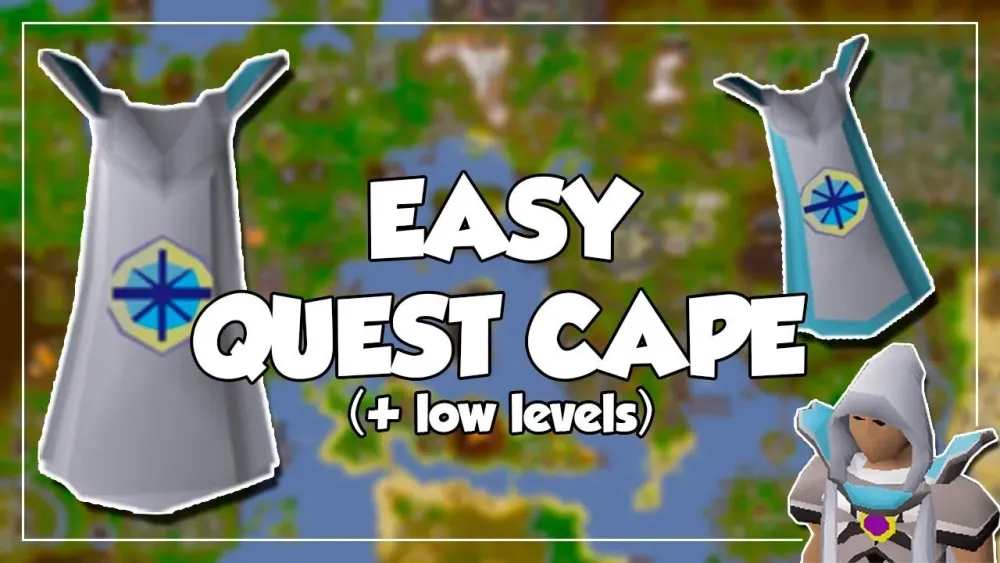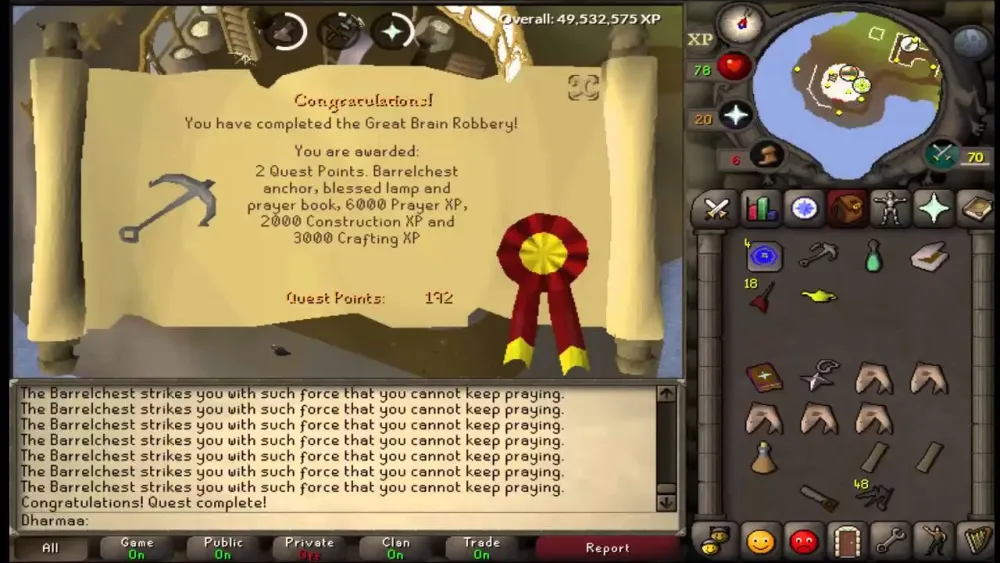Your cart is empty
Understanding OSRS Minimum Quest Requirements: A Comprehensive Guide

Warning: Undefined variable $post in /home/osrsmoneymaking.guide/public_html/wp-content/themes/kadence/functions.php on line 391
Warning: Attempt to read property "ID" on null in /home/osrsmoneymaking.guide/public_html/wp-content/themes/kadence/functions.php on line 391
Old School RuneScape (OSRS) quests are an integral part of the game, offering players rich narratives, unique challenges, and valuable rewards. Each quest varies in difficulty and complexity, requiring players to meet specific prerequisites. Understanding these minimum quest requirements is crucial for players aiming to unlock new areas, skills, and equipment, enhancing their overall gameplay experience.
Quest requirements in OSRS serve several important purposes that significantly impact a player’s journey through the game. Firstly, they establish a structured progression system, guiding players through the expansive content in a logical manner. This ensures that players develop their skills and knowledge of the game before tackling more challenging quests. By completing prerequisite quests, players gain essential experience and unlock new abilities, which are crucial for overcoming tougher challenges.
Moreover, quest requirements encourage exploration and interaction with the game world. Players must engage with various regions, NPCs, and mechanics, deepening their understanding of the game’s lore and environment. This exploration often leads to discovering hidden secrets, unique items, and additional quests, enriching the overall gaming experience.
Additionally, understanding quest requirements can significantly enhance a player’s efficiency. Many quests offer valuable rewards, such as powerful items, experience boosts, and access to new areas. By knowing which quests to prioritize based on their requirements, players can optimize their gameplay, making strategic decisions about skill training and resource management. This foresight helps avoid unnecessary setbacks, ensuring a smoother progression through the game.
Lastly, quest requirements foster a sense of accomplishment. Completing challenging quests provides players with a sense of achievement and motivates them to pursue even greater challenges. This intrinsic reward system is a fundamental aspect of OSRS, keeping players engaged and invested in their journey.
Overview of Minimum Quest Requirements

In the world of Old School RuneScape (OSRS), quests play a vital role in shaping your character’s journey and enhancing your gaming experience. However, each quest has its own unique set of requirements that players must meet before they can embark on the adventure. This is where minimum quest requirements come into play.
Minimum quest requirements refer to the specific quests that players must complete to unlock further quests or skills within the game. These prerequisites ensure that players have the necessary experience and skills to tackle more challenging content. Understanding these requirements is crucial for anyone looking to progress efficiently in OSRS.
Typically, minimum quest requirements fall into several categories:
- Skill Levels: Certain quests require you to have reached a specific level in various skills.
- Quest Completion: Some quests can only be attempted after completing previous ones.
- Items or Equipment: Occasionally, you may need specific items or equipment to start a quest.
By keeping track of the minimum quest requirements, players can save time and avoid frustration. Always check the quest log or community resources for the most up-to-date information. This way, you’ll know exactly what you need to do before diving into a new quest!
Key Quests with Minimum Requirements
Some quests in OSRS are particularly significant due to their minimum requirements, which often set the stage for advanced gameplay and unlock essential features. Here’s a list of key quests that players should be aware of:
| Quest Name | Minimum Requirements |
|---|---|
| Dragon Slayer | Level 32 Attack, Level 30 Defence, and completion of “The Knight’s Sword.” |
| Animal Magnetism | Level 18 Crafting, Level 35 Woodcutting, and completion of “The Restless Ghost.” |
| Plague City | Completion of “The Biohazard,” Level 10 Agility. |
| Monkey Madness I | Level 10 Agility, Level 20 Attack, and completion of “The Grand Tree.” |
These quests not only have minimum requirements but also offer substantial rewards upon completion, such as experience points, items, and access to new areas. It’s crucial to plan your questing path strategically to take full advantage of the game’s offerings!
How to Check Your Quest Progress
Tracking your quest progress in Old School RuneScape (OSRS) is crucial for efficient gameplay. Fortunately, the game provides a few simple methods to keep tabs on what you’ve accomplished and what still needs to be done.
Here are some effective ways to check your quest progress:
- Quest Journal: Your primary tool for checking quest progress is the Quest Journal. You can access it by clicking on the book icon in your quest tab. This journal categorizes quests into three sections: All Quests, In Progress, and Completed. You can easily see which quests you have started, which ones you’ve completed, and any required items or levels.
- Quest Helper: If you’re stuck on a particular quest, consider using a quest helper tool. Many websites and community resources offer guides that track your progress and provide step-by-step instructions. These can be particularly useful for more complicated quests.
- OSRS Wiki: The OSRS Wiki is an extensive resource that lists all quests along with their requirements and rewards. You can search for a specific quest and get detailed information about your current progress.
- In-Game Notifications: When you complete a quest, the game provides a notification. Make sure to pay attention to these alerts as they help you keep track of your accomplishments.
Tips for Meeting Quest Requirements
Meeting quest requirements in OSRS can sometimes feel overwhelming, especially for newer players. However, with the right strategies, you can simplify the process and get on with your adventures. Here are some handy tips:
- Plan Ahead: Before starting a quest, check the requirements in your Quest Journal. Make a checklist of skills, items, and quests you need to complete beforehand. This way, you won’t face unexpected hurdles.
- Utilize Guides: Don’t hesitate to consult guides. Whether it’s a video tutorial or a text guide, having a roadmap can save you time and frustration.
- Join a Clan: OSRS clans can provide support and advice. Fellow players can share their experiences and help you meet requirements more efficiently.
- Skill Training: Focus on leveling up skills that are frequently required for quests. Skills like Cooking, Crafting, and Fishing are commonly needed, so having them leveled up can speed up your questing.
- Inventory Management: Keep your inventory organized with the necessary items for quests. This reduces downtime spent searching for items.
By keeping these tips in mind, you can streamline your questing experience and enjoy all that OSRS has to offer!
Common Mistakes to Avoid
Questing in Old School RuneScape (OSRS) can be a rewarding experience, but it’s easy to trip up along the way. Here are some common mistakes players make and tips on how to avoid them:
- Ignoring Quest Guides: Many players think they can wing it through quests. While some quests are straightforward, others can be tricky. Always consider checking a quest guide to understand the requirements and steps involved.
- Not Checking Requirements: Before starting a quest, make sure you meet all the minimum skill and item requirements. Skipping this step can lead to frustration when you realize you can’t proceed.
- Underestimating Time: Some quests can take longer than expected. Plan your game time accordingly and avoid starting lengthy quests when you have limited playtime.
- Ignoring NPC Dialogue: Skimming through conversations might seem harmless, but important clues and instructions can be missed. Take the time to read what NPCs say to avoid unnecessary confusion later.
- Not Utilizing the Bank: Many quests require specific items, and forgetting to bring them can mean backtracking. Make a checklist of necessary items before starting a quest to ensure you have everything on hand.
- Quitting Mid-Quest: It can be tempting to pause your quest halfway through, but this can lead to forgetting crucial details. Try to complete quests in one sitting, or take notes if you need to log out.
By being aware of these common pitfalls, you can streamline your questing experience and enjoy the rich lore and challenges OSRS has to offer!
Resources for Questing in OSRS
When it comes to questing in OSRS, having the right resources can make a world of difference. Here are some valuable tools and websites that can help enhance your questing journey:
| Resource | Description |
|---|---|
| OSRS Wiki | The go-to source for everything OSRS. It contains detailed quest guides, item locations, and skill requirements. |
| YouTube Guides | Various YouTubers create walkthroughs with visual aids for quests. Watching these can provide clarity and tips. |
| RuneLite | A popular third-party client that features quest helpers, timers, and other utilities to enhance your gameplay experience. |
| Discord Groups | Joining OSRS Discord communities can connect you with experienced players who can offer advice and assistance. |
| The OSRS subreddit is a treasure trove of tips, shared experiences, and recommendations for questing strategies. |
Utilizing these resources can help you navigate the complexities of questing in OSRS, making your gameplay smoother and more enjoyable. Happy questing!
Understanding OSRS Minimum Quest Requirements: A Comprehensive Guide
Old School RuneScape (OSRS) is a game rich in lore, adventures, and quests. For players looking to progress efficiently, understanding the minimum quest requirements is crucial. This guide breaks down the essentials that every player should know.
Quests in OSRS often unlock new areas, items, and gameplay features, making them an integral part of the game. Each quest has specific requirements that players must meet, including skills, items, and previous quests completed. Here is a summary of key components:
- Skill Levels: Many quests require specific skill levels. For example, a quest might require 10 Cooking and 15 Woodcutting.
- Items: Certain quests necessitate having specific items. Players should check the quest requirements before starting.
- Previous Quests: Some quests can only be accessed after completing others. This is often seen in quest chains.
To help players navigate through quests effectively, here’s a brief table of common quest requirements:
| Quest Name | Skill Requirement | Previous Quest |
|---|---|---|
| Dragon Slayer | 60 Attack | None |
| Animal Magnetism | Required Skills: 55 Woodcutting, 50 Fletching | None |
| The Grand Tree | 25 Agility | Tree Gnome Village |
By understanding these requirements, players can plan their quests more effectively, ensuring they meet all prerequisites before diving into challenging adventures.
Conclusion: The Importance of Planning Your Quests
Planning your quests in OSRS is essential for efficient gameplay, ensuring you meet all skill, item, and prerequisite requirements, which ultimately enhances your gaming experience.
Warning: Undefined variable $post in /home/osrsmoneymaking.guide/public_html/wp-content/themes/kadence/functions.php on line 391
Warning: Attempt to read property "ID" on null in /home/osrsmoneymaking.guide/public_html/wp-content/themes/kadence/functions.php on line 391

